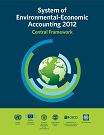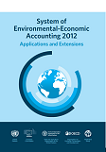- Biblioteca CEPAL
- Biblioguias
- Estadisticas Ambientales en inglés
- Environment and climate change statistics for Latin America and the Caribbean
- Environmental and Ecosystem Accounts
Environment and climate change statistics for Latin America and the Caribbean
What are environmental accounts?
The environmental accounts integrate the economic and environmental aspects and enable their integrated analysis, promoting more effective intervention. This statistical product allows to obtain tables (of natural resource assets, supply and use of environmental flows) and environmental-economic indicators aggregated at the national level, and in different disaggregations such as: by type of economic activity (agriculture, manufacturing, trade , transportation), or by institutional sector (industries, households, government); as well as carrying out different economic modeling analyses, such as those of general equilibrium with environmental variables, and those of input-output with physical units for material footprint analyses.
More detailed information on the state and quality of natural capital, available to the countries of the region, can provide relevant elements to measure the impacts of development policies and "green" growth strategies.
They are based on the System of Environmental-Economic Accounting (SEEA), which is considered the satellite system of environmental statistics and, therefore, it is integrated into the international guidelines related to the System of National Accounts, SNA 2008.
The System of Environmental-Economic Accounting—Ecosystem Accounting (SEEA EA) is a spatiallybased, integrated statistical framework for organizing biophysical information about ecosystems, measuring ecosystem services, tracking changes in ecosystem extent and condition, valuing ecosystem services and assets and linking this information to measures of economic and human activity.
SEEA EA was developed by a multidisciplinary group of experts to respond to a range of policy demands and challenges with a focus on making visible the contributions of nature to the economy and people, and on better recording the impacts of economic and other human activity on the environment. To this end, ecosystem accounting incorporates a wider range of benefits to people than captured in standard economic accounts and provides a structured approach to assessing the dependence and impacts of economic and human activity on the environment.
-
 System of Environmental-Economic Accounting 2012 - Central Framework
by
Publication Date: 2012It is a comprehensive statistical framework made up of a set of tables and accounts, which guide the compilation of comparable and consistent statistics and indicators for policy formulation, analysis and research.
System of Environmental-Economic Accounting 2012 - Central Framework
by
Publication Date: 2012It is a comprehensive statistical framework made up of a set of tables and accounts, which guide the compilation of comparable and consistent statistics and indicators for policy formulation, analysis and research.
ST/ESA/STAT/Ser.F/109 -
 SEEA Applications and Extensions
Publication Date: 2014How to use SEEA Central Framework accounts for decision making, policy formulation and research.
SEEA Applications and Extensions
Publication Date: 2014How to use SEEA Central Framework accounts for decision making, policy formulation and research.
-
System of Environmental-Economic Accounting - Ecosystem Accounting by
Publication Date: 2021 -
 System of Environmental-Economic Accounting for Water
by
Publication Date: 2012ST/ESA/STAT/SER.F/100
System of Environmental-Economic Accounting for Water
by
Publication Date: 2012ST/ESA/STAT/SER.F/100
